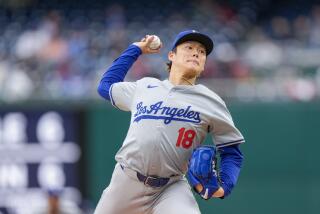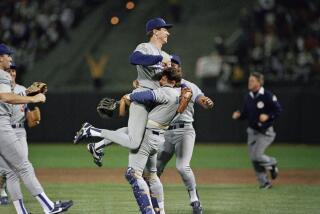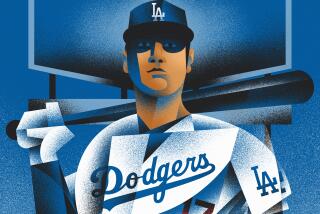Don Newcombe remembers no longer being separate, but equal at All-Star game
It was the 1949 All-Star game, second inning, two men on base, and, as impossible as it might seem today, Don Newcombe was summoned from the bullpen to face a complete stranger.
It was someone he had never seen before, someone whose name he barely knew, someone whose accomplishments he never followed.
Now batting: Joe DiMaggio?
“That’s right,” Newcombe says today, laughing. “Back then, what would a black player know about Joe DiMaggio?”
As one of four African Americans who integrated the All-Star game in 1949, the Dodgers rookie Newcombe was painfully unaware of the identity of nearly every white player in a league that had long shunned his race.
“We never, ever dreamed we’d have a chance to play in the major leagues, so why even think about it?” Newcombe says. “We never talked about it, never thought about, never watched it. When I faced DiMaggio, I really didn’t know who he was.”
Newcombe fooled DiMaggio into a groundout, and then retired Eddie Joost on a pop fly to survive the inning. He wasn’t so fortunate two innings later, giving up Joost’s two-run single that gave the American League the lead in a game it eventually won, 11-7.
Yeah, in a game in which he was the first black pitcher, Newcombe was the losing pitcher. But he has since become the lasting pitcher. Sixty-one years later, he is the last surviving member of the foursome who finally put the All in All-Star.
Newcombe has become arguably baseball’s most important living All-Star, wearing pressed suits and Panama hats and huge smiles while carrying the legacy of midsummer diversity through the middle of every July. He has also become the Dodgers’ most endearing ambassador, and the perfect person to be honored down the road Tuesday night at the All-Star game in Anaheim.
Except he’s not going. He wasn’t invited. But it’s fine with him.
Newcombe, still active at age 84, has business meetings in New York this week, so he says he couldn’t have attended anyway. He loves Commissioner Bud Selig for the way he’s honored Jackie Robinson, so he doesn’t mind if he is occasionally overlooked.
“What Bud has done for Jackie and his memory, I applaud and respect him,” Newcombe says. “Jackie was our leader. Jackie is the one who should always remembered.”
But let’s not forget Newk, OK?
He is the one who has been blessed to carry Robinson’s memory the longest, showing up many nights behind the batting cage at Dodger Stadium to greet fans and counsel players about events that occurred more than half a century ago, talking about rooming with Robinson and fighting with bigots, a living piece of baseball’s most significant moment.
“Some of the younger kids don’t recognize me,” he says. “But then when I tell them who I am and, oh, they know.”
And they listen, especially the young African American players, the likes of Matt Kemp and Russell Martin hugging him and asking if they can borrow his exquisite trademark threads.
“I dress like that because I want these kids to know what it’s like to look professional,” he says. “And because I remember when I didn’t have any clothes.”
For years, Newcombe has lived in Robinson’s shadow, arriving in the big leagues two years after Robinson, everyone thinking it was much easier for him, thinking the path was already cut.
Well, it wasn’t. Standing side by side with Robinson, Newcombe fought many of the same battles without the same publicity, being thrown off a bus, being banned from a hotel, pitching with Secret Service men surrounding him in the bullpen because of death threats.
“We all started the civil rights movement, but Branch Rickey told us to only make it about baseball,” he says. “We had to tear this terrible barrier down with only a baseball.”
Finally, in the 1949 All-Star game, Robinson and Newcombe became equals, joining Roy Campanella and Larry Doby as the first black All-Stars for the game in Brooklyn’s Ebbets Field.
Which raises a question that still irks Newcombe.
How can Robinson win rookie of the year and finish fifth in MVP voting in 1947, have a similar start the following season, then not even make the All-Star team that year? Why did it take baseball’s greatest figure 2 1/2 good seasons before being asked to play in its marquee game?
“You tell me, where was the game in 1948?” asks Newcombe.
It was in St. Louis’ Sportsman’s Park, a noted hotbed of racism.
“Well, that could be your answer,” Newcombe says.
The thing Newcombe remembers most about that first All-Star game was, believe it or not, his hitting. In the second inning, he smacked a run-scoring fly ball into the left-field corner that was sucked up in an amazing catch by Ted Williams.
Ted who?
“I had never seen him, but I heard he wasn’t a good fielder,” Newcombe said. “After the game, I found him and told him that. He just kind of laughed.”
Of course. An All-Star is completely unfamiliar with one of the greatest All-Stars? How crazy, and sad, is that?
Thank goodness Newcombe is still around to remind us. Our living, teaching midsummer classic.
twitter.com/billplaschke
Clicking on Green Links will take you to a third-party e-commerce site. These sites are not operated by the Los Angeles Times. The Times Editorial staff is not involved in any way with Green Links or with these third-party sites.
More to Read
Are you a true-blue fan?
Get our Dodgers Dugout newsletter for insights, news and much more.
You may occasionally receive promotional content from the Los Angeles Times.







